#nobelprize in literature
Text
1.Title: "Great Alfred Nobel's Luminary: A Sonnet of Humanitarian Enlightenment"
Written by World Humanitarian Poet Sibshankar Roy Laskar from INDIA.
“Great Alfred Nobel's luminary, a beacon bright,
Guiding hearts to kindle love's pure light.
With every deed, a testament we show,
To empathy and peace, the seeds we sow.
Inspir'd by his legacy, we aspire,
To spread benevolence, igniting a fire.”
2.Title: "Great Alfred Nobel's Radiance: A Sonnet of Humanitarian Inspiration"
Written by World Humanitarian Poet Sibshankar Roy Laskar from INDIA.
“Great Alfred Nobel's radiance, a beacon shining bright,
Guiding us to spread love's gentle light.
In his footsteps, we find our guiding star,
Inspiring others near and far.
With every act of kindness, we impart,
The essence of peace, warming every heart.”
3.Title: "The Alfred Nobel's Vision: A Sonnet of Humanitarian Unity"
Written by World Humanitarian Poet Sibshankar Roy Laskar from INDIA.
“Great Alfred Nobel's vision, a beacon for the kind,
Inspir'd by him, compassion we'll unbind.
With each act of love, a ripple we sow,
Uniting hearts to make humanity glow.
In spreading peace, fraternity we find,
In Great Alfred Nobel's footsteps, leaving hate behind.”
4.Title: "The Alfred Nobel's Legacy: A Sonnet of Humanitarian Dedication"
Written by World Humanitarian Poet Sibshankar Roy Laskar from INDIA.
“Great Alfred Nobel's legacy, a beacon for us all,
Inspiring hearts to heed compassion's call.
With every step we take, with every hand we lend,
We strive to spread goodwill and peace without end.
In Nobel's light, our purpose finds its place,
Guiding us to uplift the human race.”
5.Title: "Great Alfred Nobel's Compassion: A Sonnet of Humanitarian Inspiration"
Written by World Humanitarian Poet Sibshankar Roy Laskar from INDIA.
“In Alfred Nobel's name, a legacy profound,
Inspiring hearts to spread compassion 'round.
With every act of kindness, we ignite,
A flame of hope, dispelling darkest night.
United in our quest for peace, we stand,
Guided by love, extending helping hand.”
6.Title: "The Alfred Nobel's Radiance: A Sonnet of Humanitarian Hope"
Written by World Humanitarian Poet Sibshankar Roy Laskar from INDIA.
“In the Alfred Nobel's radiance, we find our call,
To spread compassion and uplift all.
Inspired by his legacy, we rise,
To mend the world with love's eternal ties.
With each act of kindness, we impart,
The essence of peace, a gift from the heart.”
7.Title: "Great Alfred Nobel's Legacy: A Sonnet of Humanitarian Enlightenment"
Written by World Humanitarian Poet Sibshankar Roy Laskar from INDIA.
“The Alfred Nobel’s legacy, a beacon for the soul,
Inspiring kindness, making broken whole.
With every deed, we honor his great name,
Spreading love and peace, igniting the flame.
In his footsteps, we tread with grace and might,
To build a world where compassion takes flight.”
8.Title: "Great Alfred Nobel's Legacy: A Sonnet of Humanitarian Harmony"
Written by World Humanitarian Poet Sibshankar Roy Laskar from INDIA.
“In The Alfred Nobel's footsteps, we find our guiding star,
Inspiring acts of kindness, near and far.
With hearts ablaze, we answer to the call,
To spread compassion and uplift us all.
Through noble deeds, his legacy we share,
A world united in love, beyond compare.”
9.Title: "Great Alfred Nobel's Echo: A Sonnet of Humanitarian Reverence"
Written by World Humanitarian Poet Sibshankar Roy Laskar from INDIA.
“In The Alfred Nobel's echo, whispers of his creed,
We find the strength for every noble deed.
His legacy, a torch that brightly burns,
Inspiring hearts, compassion ever yearns.
With each act of kindness, we uphold,
The spirit of his vision, manifold.”
10.Title: "The Alfred Nobel's Compassion: A Sonnet of Humanitarian Grace"
Written by World Humanitarian Poet Sibshankar Roy Laskar from INDIA.
“In Great Alfred Nobel's honour, we pledge to embrace,
The call to kindness, the world to grace.
With each act of love, a ripple we send,
To every corner, where hearts may mend.
Inspired by his legacy, we ignite,
A fire of compassion, spreading light.”
11.Title: "The Great Alfred Nobel's Embrace: A Sonnet of Humanitarian Harmony"
Written by World Humanitarian Poet Sibshankar Roy Laskar from INDIA.
“In The Great Alfred Nobel's echo, whispers of grace,
We find our purpose, in every place.
Inspired to inspire, a chain we weave,
Humanitarian dreams, to believe.
With each act of kindness, we ignite,
A world ablaze with love, shining bright.”
12.Title: "The Alfred Nobel's Beacon: A Sonnet of Humanitarian Light"
Written by World Humanitarian Poet Sibshankar Roy Laskar from INDIA.
“Great Alfred Nobel's beacon shines through the darkest night,
Inspiring deeds of love, a guiding light.
With every hand extended, hearts unite,
To spread benevolence, banish the blight.
In Alfred Nobel's legacy, we find our way,
To forge a world where kindness holds sway.”
13.Title: "Great Alfred Nobel's Compass: A Sonnet of Humanitarian Compassion"
Written by World Humanitarian Poet Sibshankar Roy Laskar from INDIA.
“In The Alfred Nobel's footsteps, strides of grace we trace,
Inspiring love and kindness to embrace.
With every act, a ripple through the soul,
A testament to peace, our ultimate goal.
In spreading light, we honor Nobel's name,
And in our deeds, his legacy we acclaim.”
14.Title: "Great Alfred Nobel's Radiance: A Sonnet of Humanitarian Grace"
Written by World Humanitarian Poet Sibshankar Roy Laskar from INDIA.
“In The Alfred Nobel's radiance, we find our way,
To sow the seeds of kindness every day.
Inspired by his vision, hearts aflame,
We spread compassion, honoring his name.
With every gesture, big or small in sight,
We forge a world where love and peace unite.”
15.Title: "Great Alfred Nobel's Beacon: A Sonnet of Humanitarian Inspiration"
Written by World Humanitarian Poet Sibshankar Roy Laskar from INDIA.
“Great Alfred Nobel's legacy, a beacon brightly gleams,
Igniting hearts to chase benevolent dreams.
With every hand extended, every smile,
We bridge divides, traverse each weary mile.
In spreading peace, we honor his great name,
And through our deeds, we kindle love's pure flame.”
16.Title: "The Alfred Nobel's Legacy: A Sonnet of Humanitarian Grace"
Written by World Humanitarian Poet Sibshankar Roy Laskar from INDIA.
“In Great Alfred Nobel's legacy, a boundless flame,
We find the courage to endow the same.
With every act of kindness, hearts ignite,
Inspiring others to join the fight.
To spread peace and goodwill, our noble quest,
In Alfred Nobel's spirit, we find our best.”
17.Title: "The Alfred Nobel's Call: A Sonnet of Humanitarian Grace"
Written by World Humanitarian Poet Sibshankar Roy Laskar from INDIA.
“In Great Alfred Nobel's footsteps, we find our noble call,
To lift the fallen, heal the wounded soul,
With deeds of kindness, let our light shine bright,
Inspiring hope, dispelling darkest night.
For in each act of love, we truly see,
The legacy of Nobel, boundless and free.”
18.Title: "The Alfred Nobel’s Noble Acts: A Tribute to Alfred Nobel"
Written by World Humanitarian Poet Sibshankar Roy Laskar from INDIA.
“In the footsteps of Great Alfred Nobel, we aspire,
To spread benevolence, our hearts afire.
Inspired by his legacy, we unite,
In acts of kindness, bringing forth the light.
With every deed, a ripple in the sea,
Of peace and love, for all humanity.”
19.Title: "The Great Alfred Nobel's Legacy: A Beacon of Hope"
Written by World Humanitarian Poet Sibshankar Roy Laskar from INDIA.
“From Alfred Nobel's vision, our purpose we glean,
To be the change, to intervene.
Inspired by his quest for peace profound,
We sow compassion, the world around.
In every act, a testament we find,
To unity, to love, to humankind.”
TRIBUTE TO THE GREAT ALFRED NOBEL, WRITTEN BY SIBSHANKAR ROY LASKAR WORLD’S HUMANITARIAN POET OF INDIA.
#nobelprizeforliterature #nobelprize #nobelcommittee #nobelprizeinliterature #nobelliteratureprize #magazine #worldpeace #viralpoetry #viralinstagram #viralposts #viralreel #viral #poetry #fraternity #liturature #pinterest #magazine #website #webpage #instagram #facebook #google #world #virałreels #viralinstagram #viralshorts #viralposts #viral #nobelprize #nobelcommittee #nobelprizeforliterature #alfrednobel #humanity #fraternity #peace #viralpoetry #googlreels #googleviral #googolpoem #google #googlepoetry
#youtube#nobel prize#sibshankarroylaskar#literature#poetry#viralpage#sweeden#viral#viralpost#viral trends#nobelprizeforliterature nobelprize nobelcommittee nobelprizeinliterature nobelliteratureprize magazine worldpeace viralpoetry v #nobelprize org#nobelprize in literature#nobelprize#nobel peace prize#google#webmagazine#website#world
0 notes
Text
"I am what I choose to become."

Jean-Paul Charles Aymard Sartre was a French philosopher, playwright, novelist, screenwriter, political activist, biographer, and literary critic, considered a leading figure in 20th-century French philosophy and Marxism. Sartre was one of the key figures in the philosophy of existentialism.
Born: 21 June 1905, Paris, France
Died: 15 April 1980 (age 74 years), Paris, France
Existentialist Philosopher: Sartre is often regarded as the father of existentialist philosophy. He emphasized the individual's freedom and responsibility in creating their own essence and values. His most famous dictum, "Existence precedes essence," encapsulates the core idea that human existence is not predetermined and that individuals define themselves through their actions.
Prolific Writer: Sartre was a highly prolific writer and produced a vast body of work. Some of his notable philosophical works include "Being and Nothingness," "Existentialism is a Humanism," and "Critique of Dialectical Reason." In addition to philosophy, he wrote plays, novels, and essays, contributing significantly to literature and the arts.
Literary Achievements: Sartre was not only a philosopher but also a celebrated literary figure. He won the Nobel Prize in Literature in 1964, but he declined the award, stating that he always declined official honors. His literary works include plays like "No Exit" and "The Flies," as well as novels such as "Nausea" and "The Roads to Freedom" trilogy.
Political Engagement: Sartre was actively engaged in politics throughout his life. He aligned himself with leftist and Marxist ideologies and was involved in political activism. He criticized colonialism, supported anti-imperialist movements, and was a prominent figure in the French intellectual and political scene during the mid-20th century.
Life and Relationships: Sartre had a complex personal life. He had a lifelong romantic and intellectual partnership with Simone de Beauvoir, another influential existentialist philosopher and writer. Despite their deep connection, they maintained a non-traditional, open relationship. Sartre's experiences during World War II, including his time as a prisoner of war, also influenced his philosophical and political views.
#JeanPaulSartre#Existentialism#Philosopher#Playwright#Novelist#Literature#NobelPrize#PoliticalActivist#SimoneDeBeauvoir#FrenchPhilosopher#BeingandNothingness#Nausea#NoExit#CriticalTheory#Humanism#Freedom#PhilosophicalLegacy#ParisIntellectuals#OpenRelationship#PoliticalEngagement#quoteoftheday#today on tumblr
2 notes
·
View notes
Text
me: hey kai, while youre too tired to actually write, you could do minor planning for that silly minecraft au fic your brain is stuck on. you could just come up with usernames and simple stuff.
also me: *creates controversy and backstories for background characters who might not even show up even if i wrote the fic*
also also me: *using my knowledge of spanish to read a wikipedia page in french about tigritude which is a concept created in 1962 by nigerian writer wole soyinka in response to a movement that i think was like affirming négritude, which is a framework of critique and literary theory developed in the 1930s and mostly used by francophones and african diaspora politicians, as an emancipatory concept for black people*
#personal#adhd#this is like full full adhd moments#i was looking for words relates to tiger#found a quote ''a tiger does not shout its tigritude it acts'' and was like what the fuck is tigritude#and the wikipedia is only a ailable in french#i dont speak french#i dont read french#i know like maybe 10 words in french#but i can read spanish and to a lesser extent speak it#so i have spent half an hour reading a wikipedia page in a language i dont speak about a concept reacting to something i know nothing about#i have not heard of négritude before#i imagine if id studied sociology in france i would have#but i studied it in england#but i still read this wiki#his critique i think is like the idea of it is shallow and doesnt address more pressing matters#theres also some dispute between the usefulness of it for anglophones vs francophones#and the difference in black experiences and their relationship to colonisation between anglophones and francophones#wole soyinka still put forth léopold sédar senghors name for the nobelprize for literature in 1970 despite léopold writing négritude pieces#so like idk enemies to lov-ahxkskskskskxkskd#if i translated it correctly aimé césaire who was one of the founders of négritude said it was a good pun#but that it actually showed like societal differences between generations as wole soyinka felt less need to assert his négritude#maybe? i think thats what it said#also i think maybe the quote was first said in a conference of african writers in kampala which i think is the capital of uganda#the website i found the quote on does not seem to have this context also which is fun sjdkdkdldksm#anyway thats enough rambling about my adventures in reading in languages i dont speak djfkskc#im much better at reading portuguese or romanian than french#or like catalan or vasco etc#the gap between spanish and french is a difficult one#i really should not be doing this much like the fatigue has been bad this week and i was meant to be reserving my energy
3 notes
·
View notes
Text
Kazuo Ishiguro | Author Biography

Introduction
Kazuo Ishiguro, a name resonating with literary brilliance, has crafted a remarkable legacy in the world of contemporary literature. Born in Nagasaki, Japan, in 1954, Ishiguro's life journey is as intriguing as the narratives he weaves. Let's embark on a captivating exploration of Kazuo Ishiguro's biography, delving into the cultural influences, literary contributions, and the man behind the words.
Outline of the Article:
- Introduction
- Brief overview of Kazuo Ishiguro
- Setting the stage for exploring his life and literary contributions
- Early Life and Cultural Influences
- Birth and upbringing in Nagasaki, Japan
- Impact of cultural experiences on Ishiguro's worldview
- Educational Journey
- Transition to the United Kingdom
- Academic pursuits and early literary interests
- Literary Beginnings
- Early works and entry into the literary world
- Recognition and challenges as a budding writer
- Breakthrough with "The Remains of the Day"
- Overview of the novel's significance
- The impact of winning the Booker Prize
- Exploration of Themes
- Ishiguro's recurring themes in his novels
- Deep dives into select works and their underlying messages
- Writing Style and Narrative Techniques
- Unique writing style and narrative approaches
- Influence on the literary landscape
- Awards and Recognitions
- Ishiguro's notable literary awards
- Contributions to contemporary literature
- Adaptations and Screenplays
- Novels adapted into films
- Ishiguro's involvement in screenplay writing
- Personal Life and Philosophies
- Ishiguro's views on literature and life
- Insight into his private life
- Global Impact
- International recognition and readership
- Cultural impact of Ishiguro's works
- Challenges and Criticisms
- Criticisms faced by Ishiguro
- How he responds to literary criticisms
- Legacy and Future Prospects
- Ishiguro's enduring legacy
- Speculations about future literary endeavors
- Conclusion
- Summarizing Ishiguro's journey and contributions
- Reflecting on his impact on contemporary literature
- FAQs
- Common questions about Ishiguro's life and works
Kazuo Ishiguro | Author Biography
Early Life and Cultural Influences
Kazuo Ishiguro's early life was a delicate dance between the traditions of Nagasaki, Japan, and the alluring pull of the Western world. Born to immigrant parents in 1954, the echoes of his cultural heritage resonated through the vibrant tapestry of Nagasaki's traditions. This early exposure to diverse customs and perspectives laid the groundwork for Ishiguro's later exploration of cultural nuances in his literary works.
Growing up amid the fusion of Japanese and Western influences, Ishiguro developed a unique cultural lens. The traditional ceremonies and rituals of Nagasaki provided a sense of continuity, while the Western world represented a realm of exploration and adaptation. This dual cultural immersion became a crucible for Ishiguro's artistic identity, shaping his narrative voice and thematic choices in the realm of literature.
Educational Journey
In the late 1950s, Ishiguro's family embarked on a transformative journey, moving to the United Kingdom. Settling in Surrey, England, Ishiguro found himself navigating not only the academic corridors of his new home but also the intricate corridors of cultural integration. His educational journey became a bridge between two worlds, offering him a rich tapestry of experiences that would soon find expression in his writing.
While attending Woking County Grammar School, Ishiguro's thirst for knowledge expanded beyond the classroom. The enchanting landscapes of Surrey became a backdrop for his intellectual explorations, laying the groundwork for his future literary endeavors. This period of cultural adaptation and academic growth would later inform the nuanced perspectives embedded in his novels.
Literary Beginnings
The spark of Ishiguro's literary journey ignited during his university days at the University of Kent. Studying creative writing and philosophy provided him with the tools to articulate the stories brewing within his creative mind. The vibrant literary scene at the university became a playground for experimentation, where Ishiguro started weaving the threads of narrative that would eventually define his unique storytelling style.
His early attempts at writing were akin to a painter's first strokes on a canvas, capturing the raw essence of his imagination. This experimental phase was crucial for Ishiguro, laying the groundwork for the thematic elements and narrative techniques that would later distinguish his works. The initial struggles and triumphs during these formative years marked the birth of a literary craftsman.
Breakthrough with "The Remains of the Day"
The zenith of Ishiguro's literary ascent was marked by the publication of "The Remains of the Day" in 1989. This magnum opus, exploring the intricacies of duty, the fallibility of memory, and the layers of self-deception, was a literary triumph that reverberated far beyond the confines of traditional storytelling.
The Booker Prize bestowed upon "The Remains of the Day" was not merely an accolade but a coronation of Ishiguro's narrative prowess. The novel's exploration of an English butler's life became a canvas where Ishiguro painted the subtle complexities of human existence. The international acclaim that followed elevated Ishiguro to the pantheon of literary greats, marking a turning point in his career and solidifying his position as a master storyteller.
In retrospect, Ishiguro's early life and cultural influences, educational journey, and the milestones of his literary beginnings coalesce into a narrative mosaic. This mosaic, rich with cultural nuances and intellectual exploration, serves as a testament to the intricate layers that form the foundation of Ishiguro's captivating storytelling.
Exploration of Themes
Kazuo Ishiguro stands as a literary alchemist, weaving intricate tapestries of profound themes with a delicate touch. His novels, such as "Never Let Me Go" and "The Buried Giant," serve as portals into the complexities of the human experience. Ishiguro, like a philosophical navigator, delves into the intricacies of relationships, the ephemeral nature of time, and the enigma of memory. Through his nuanced exploration of these themes, he invites readers to embark on journeys that resonate with the essence of their own existence. For beginners, Ishiguro's approach becomes a masterclass, illustrating the art of infusing depth into storytelling.
Writing Style and Narrative Techniques
Ishiguro's writing is an orchestra of restraint and emotional resonance, conducted with finesse. His narratives unfold like delicate origami, revealing layers of complexity with each turn. What sets Ishiguro apart is his adept use of unreliable narrators, a narrative technique that adds a mystique to his storytelling. The first-person perspective becomes a vessel through which readers traverse the landscapes of emotion and introspection. Aspiring writers can glean valuable insights from Ishiguro's playbook, learning the craft of creating immersive experiences through a finely tuned writing style.
10 quotes by Kazuo Ishiguro:
- "Memory, I realize, can be an unreliable thing; often it is heavily coloured by the circumstances in which one remembers, and no doubt this applies to certain of the recollections I have gathered here."
- "We all complete. Maybe none of us really understand what we've lived through, or feel we've had enough time."
- "The evening's the best part of the day. You've done your day's work. Now you can put your feet up and enjoy it."
- "It was like when you make a move in chess and just as you take your finger off the piece, you see the mistake you've made, and there's this panic because you don't know yet the scale of disaster you've left yourself open to."
- "We thought we were young and that there would be time to love well sometime in the future. This is a terrible way to think. It is no way to live, to wait to love."
- "I think of my pile of old paperbacks, their pages gone wobbly, like they'd once belonged to the sea."
- "What is pertinent is the calmness of beauty, its sense of restraint. It is as though the land knows of its own beauty, its own greatness, and feels no need to shout it."
- "You have to accept that sometimes that's how things happen in this world. People's opinions, their feelings, they go one way, then the other. It just so happens you grew up at a certain point in this process."
- "Music brings a warm glow to my vision, thawing mind and muscle from their endless wintering."
- "I am what I am because of you. You are every reason, every hope, and every dream I’ve ever had."
Awards and Recognitions
The literary cosmos has crowned Ishiguro with numerous laurels, each a testament to his literary prowess. The Booker Prize, bestowed upon "The Remains of the Day," marked the inception of his journey into literary acclaim. The crescendo came in 2017 when Ishiguro was awarded the Nobel Prize in Literature, an accolade honoring the emotional force embedded in his novels. For beginners in the realm of writing, Ishiguro's trajectory serves as a beacon, illuminating the path where dedication and storytelling prowess converge to create timeless narratives.
Adaptations and Screenplays
Ishiguro's narratives transcend the boundaries of the written word, captivating audiences on the cinematic stage. "The Remains of the Day" and "Never Let Me Go" have undergone successful metamorphoses into films, amplifying the reach of Ishiguro's storytelling. Beyond adaptations, Ishiguro has ventured into the realm of screenplay writing, showcasing his versatility. For budding writers, Ishiguro's foray into the visual realm underscores the expansiveness of storytelling. It becomes a lesson in adaptability, demonstrating how narratives can evolve to enchant audiences through different mediums. Aspiring writers can find inspiration in Ishiguro's ability to see the narrative potential beyond the confines of the written page, expanding the horizons of storytelling.
In traversing Ishiguro's exploration of themes, dissecting his writing style, unveiling the tapestry of awards, and witnessing the transformation of his narratives into visual experiences, one finds a reservoir of wisdom for those navigating the realm of writing. Ishiguro's literary odyssey becomes a guidebook for beginners, offering insights into the alchemy of storytelling and the infinite possibilities that unfold when pen meets paper.
Personal Life and Philosophies
Within the cocoon of privacy, Kazuo Ishiguro, the architect of intricate narratives, guards the details of his personal life. In interviews, he redirects the spotlight from himself to the literary realms he constructs. Yet, these glimpses unveil a creator deeply committed to his craft. Ishiguro's disciplined work routine, coupled with a devotion to the art of storytelling, becomes a beacon for aspiring writers. His life philosophy, veiled yet powerful, speaks volumes about the dedication required to breathe life into narratives. Ishiguro's enigmatic aura becomes not just a shield of privacy but a testament to the transformative power of storytelling.
Global Impact
The resonance of Ishiguro's narratives extends far beyond the borders of his birthplace. The universal themes woven into his works create a tapestry that captivates readers globally. Whether navigating the intricate dynamics of love, unraveling the complexities of identity, or plumbing the depths of the human condition, Ishiguro's storytelling transcends cultural boundaries. For beginners, this global embrace of his narratives serves as a testament to the potential for stories to become a bridge connecting diverse audiences. Ishiguro becomes not just a writer but a guide, illustrating the potency of storytelling to traverse continents and hearts.
Challenges and Criticisms
Amidst the acclaim, Ishiguro's works have faced the inevitable scrutiny that accompanies literary prominence. Criticisms, ranging from concerns of cultural appropriation to discussions about character portrayals, have punctuated the acclaim. In the labyrinth of interpretations, Ishiguro, much like the characters in "The Buried Giant," navigates the landscape of critiques with unwavering conviction. His steadfast commitment to artistic choices invites readers to engage in a nuanced dialogue about interpretation, challenging them to explore the depths of his narratives.
Legacy and Future Prospects
As the chapters of Ishiguro's literary odyssey continue to unfold, his legacy solidifies as an integral part of contemporary literature. Beyond the individual novels that grace bookshelves, Ishiguro's impact weaves into the very fabric of the literary landscape. Speculations about his future works kindle anticipation, creating a palpable excitement among readers. For beginners, Ishiguro's journey serves as both inspiration and a roadmap. It illuminates the enduring legacy that storytellers can create, inviting aspiring writers to embark on their own odyssey of storytelling. Ishiguro's legacy becomes not just a collection of novels but a testament to the transformative power of narratives.
Conclusion
In concluding our journey through Kazuo Ishiguro's biography, we find ourselves immersed in the complexities of his life and the enigmatic allure of his writing. Ishiguro's ability to seamlessly blend the ordinary and the extraordinary has left an enduring legacy, inviting readers to traverse the corridors of his literary creations. Whether exploring the quiet dignity of an English butler or navigating the haunting landscapes of alternate realities, Ishiguro beckons readers into a world where every word is a brushstroke on the canvas of human experience.
FAQs
Where was Kazuo Ishiguro born?
Kazuo Ishiguro was born in Nagasaki, Japan, in 1954.
What is Ishiguro's most famous novel?
"The Remains of the Day" is widely considered Kazuo Ishiguro's most famous novel, earning him the Booker Prize.
Has any of Ishiguro's work been adapted into films?
Yes, both "The Remains of the Day" and "Never Let Me Go" have been successfully adapted into films.
What themes does Ishiguro often explore in his novels?
Ishiguro's novels often explore themes of duty, memory, self-deception, and the complexities of human relationships.
What literary awards has Ishiguro received?
Kazuo Ishiguro has received prestigious awards, including the Booker Prize and the Nobel Prize in Literature (2017).
What are some interesting facts about Kazuo Ishiguro?
Kazuo Ishiguro, a literary luminary, harbors a fascinating array of facts. Born in Nagasaki, Japan, in 1954, Ishiguro's family moved to the UK when he was five. Surprisingly, his early aspiration was to become a singer-songwriter. The transition from music to writing led to his debut novel, "A Pale View of Hills." The enigmatic author, known for his privacy, shares a deep connection with Japanese aesthetics, subtly interwoven into his narratives. Ishiguro's diverse background, including a stint as a social worker, adds layers of richness to his storytelling palette.
What book did Kazuo Ishiguro win the Nobel Prize for?
In 2017, Kazuo Ishiguro was awarded the Nobel Prize in Literature, a crowning achievement for his exceptional contribution to the literary world. The prestigious honor recognized his body of work, with a specific nod to the emotional resonance embedded in his novels. While he gained international acclaim for several masterpieces, including "The Remains of the Day" and "Never Let Me Go," the Nobel Prize celebrated Ishiguro's profound impact on literature as a whole.
Why is Kazuo Ishiguro important?
Kazuo Ishiguro stands as a literary colossus, his importance rooted in the profound impact of his storytelling. His narratives, marked by intricate explorations of love, memory, and the human condition, transcend cultural boundaries. Ishiguro's ability to navigate complex themes with subtlety and emotional depth makes him a beacon for readers seeking profound literary experiences. His significance lies not just in individual works but in the enduring legacy he has crafted within the tapestry of contemporary literature.
What was Kazuo Ishiguro's childhood like?
Kazuo Ishiguro's childhood was a tapestry woven with threads of cultural duality. Born in Nagasaki, Japan, in 1954, Ishiguro's family moved to the UK when he was five. This early exposure to the fusion of Japanese traditions and Western influences became a foundational element shaping his worldview and literary sensibilities. The delicate balance between these cultural worlds formed the crucible in which Ishiguro's identity and early creative inklings took root.
Read the full article
#Author#AuthorBiography#biography#CulturalInfluences#Fiction#Japan#KazuoIshiguro#LiteraryExploration#literature#NobelPrize#NobelPrizeWinner#TheRemainsoftheDay#WritingStyle
0 notes
Text

Alfred nobel 10 December 1896, Sanremo, Italy
Alfred Nobel (1833–1896), Swedish inventor and philanthropist, is best known for inventing dynamite. His Nobel Prizes, established in his will, honor outstanding contributions in physics, chemistry, medicine, literature, and peace.
#Alfred nobel 10 December 1896#Sanremo#Italy#Alfred Nobel (1833–1896)#Swedish inventor and philanthropist#is best known for inventing dynamite. His Nobel Prizes#established in his will#honor outstanding contributions in physics#chemistry#medicine#literature#and peace.#alfrednobel#nobel#sweden#nobelprize#premionobel#nobelpeaceprize#science#stockholm#chimica#dynamite#peace#art#oslo#novembre#history#november#dinamite#anniversario
1 note
·
View note
Photo
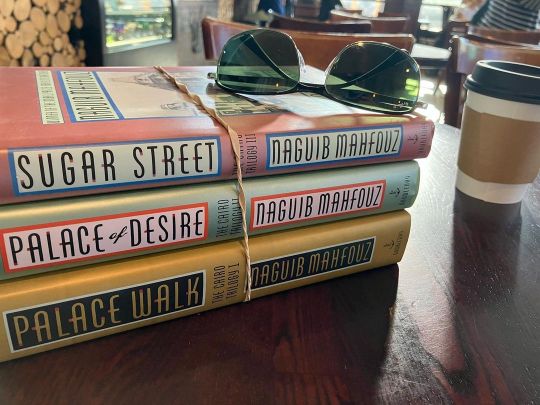
Winner in a @a.k.smileypubliclibrary silent auction. #books #bookstagram #bookworm #naguibmahfouz #nobelprize #literature #cairotrilogy (at Redlands, California) https://www.instagram.com/p/CpWIPOivtch/?igshid=NGJjMDIxMWI=
0 notes
Text
Listen in to the Ideas Podcast with Jed Rasula as he discusses the explosive impact, and enduring influence of T. S. Eliot’s modernist masterpiece The Waste Land.
Jed Rasula writes, “The Waste Land is not only a poem: it names an event, like a tornado or an earthquake. Its publication was a watershed, marking a before and after. It was a poem that unequivocally declared that the ancient art of poetry had become modern.”
In What the Thunder Said, Rasula tells the story of how The Waste Land changed poetry forever and how this cultural bombshell served as a harbinger of modernist revolution in all the arts, from abstraction in visual art to atonality in music.
1 note
·
View note
Text
Little Known Facts About the Nobel Prize!
Little Known Facts about the Nobel Prize!
#NobelPrize #Malala #Facts #Tagore #Prize #History
A Brief Overview of the Nobel Prize and its rules.
The Nobel Prize has acquired the tag of being the most prestigious prize in whatever field it is awarded. The Prize is awarded in the fields of Peace, Literature, Physics, Chemistry, Physiology or Medicine, and Economics. The first awards were presented in 1901 but not in all the categories. The Prize is named after the Swedish scientist, Alfred…

View On WordPress
#alfrednobel#chemistry#dynamite#economics#inspirational#life#literature#malala#malalayousafzai#medicine#nobel#nobelprize#peace#physics#physiology#rabindranathtagore#redcross#rudyardkipling#science#stockholm#sweden
0 notes
Photo
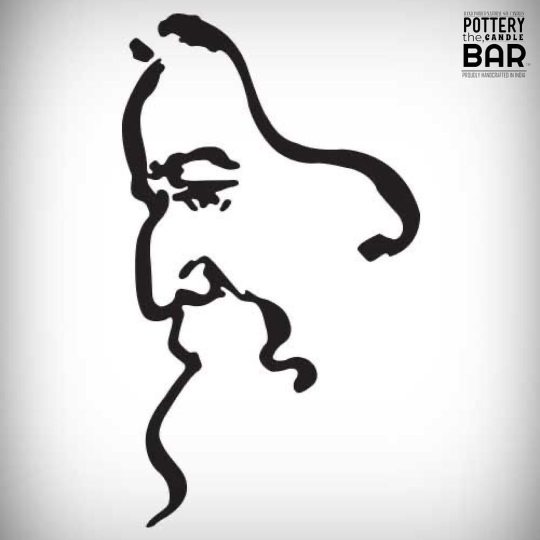
Reverence to the legend, who always inspires. HAPPY RABINDRA JAYANTI 📚 #potterycandlebar #rabindranathtagore #rabindranath #rabindrajayanti #bengal #kolkata #india #westbengal #bengali #rabindranathtagorequote #quotes #instaquotes #rabindranathtagorejayanti #share #nobelprize #winner #bengaliliterature #literature #literaturelover #nobellaureate #rabindrasangeet #gurudev #gitanjali #poetry #poetrycommunity #musician #composer #instalike #birthday #photoofday (at Pottery, The Candle Bar) https://www.instagram.com/p/CdUtKoiriSd/?igshid=NGJjMDIxMWI=
#potterycandlebar#rabindranathtagore#rabindranath#rabindrajayanti#bengal#kolkata#india#westbengal#bengali#rabindranathtagorequote#quotes#instaquotes#rabindranathtagorejayanti#share#nobelprize#winner#bengaliliterature#literature#literaturelover#nobellaureate#rabindrasangeet#gurudev#gitanjali#poetry#poetrycommunity#musician#composer#instalike#birthday#photoofday
0 notes
Photo
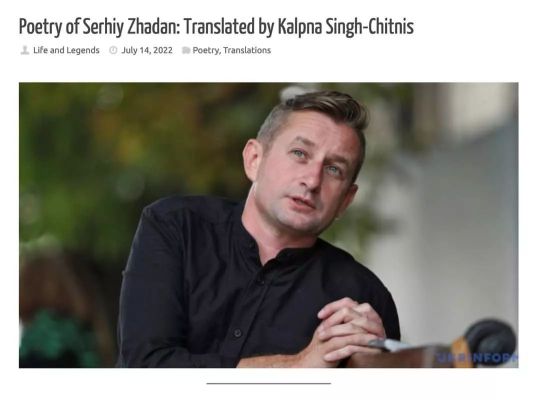
I hope you enjoy reading my translations of one of Ukraine’s most prominent poets, Serhiy Zhadan, nominated for the Nobel Prize in Literature by the Committee of Literary Studies of the Polish Academy of Sciences. To support Serhiy Zhadan’s humanitarian works and his efforts to rebuild Ukraine, please find the information @serhiy_zhadan To read his poems follow the link in my bio. #poetry #translations #Ukraine #ukrainianpoetry #poets #poetsofinstagram #poetryisnotdead #russiaukrainecrisis #humanitariancrisis #war #warpoem #hope #peace #nobelprize #nobelprizeliterature https://www.instagram.com/p/Cglr8Tlu6qG/?igshid=NGJjMDIxMWI=
#poetry#translations#ukraine#ukrainianpoetry#poets#poetsofinstagram#poetryisnotdead#russiaukrainecrisis#humanitariancrisis#war#warpoem#hope#peace#nobelprize#nobelprizeliterature
71 notes
·
View notes
Text

“This is why I value that little phrase ‘I don’t know’ so highly. It’s small, but it flies on mighty wings. It expands our lives to include the spaces within us as well as those outer expanses in which our tiny Earth hangs suspended. If Isaac Newton had never said to himself ‘I don’t know’, the apples in his little orchard might have dropped to the ground like hailstones and at best he would have stooped to pick them up and gobble them with gusto. Had my compatriot Marie Sklodowska-Curie never said to herself ‘I don’t know’, she probably would have wound up teaching chemistry at some private high school for young ladies from good families, and would have ended her days performing this otherwise perfectly respectable job. But she kept on saying ‘I don’t know’, and these words led her, not just once but twice, to Stockholm, where restless, questing spirits are occasionally rewarded with the Nobel Prize.”
- Wislawa Szymborska on the importance of telling oneself “I don't know.”
In 1996, she was awarded the Nobel Prize in Literature “for poetry that with ironic precision allows the historical and biological context to come to light in fragments of human reality.”
#NobelPrize
4 notes
·
View notes
Text
I just published "15 Poetries " of my story "GREAT ALFRED NOBEL'S HOPE ". https://www.wattpad.com/1443351122?utm_source=android&utm_medium=com.tumblr&utm_content=share_published&wp_page=create_on_publish&wp_uname=SibshankarRoyLaskar
#youtube#nobel prize#sibshankarroylaskar#literature#poetry#sweeden#viralpage#viralpost#viral#viral trends#google#nobel peace prize#nobelprize in literature#nobelprizeforliterature nobelprize nobelcommittee nobelprizeinliterature nobelliteratureprize magazine worldpeace viralpoetry v #nobelprize org#nobelprize
0 notes
Text
"Happiness in intelligent people is the rarest thing I know."
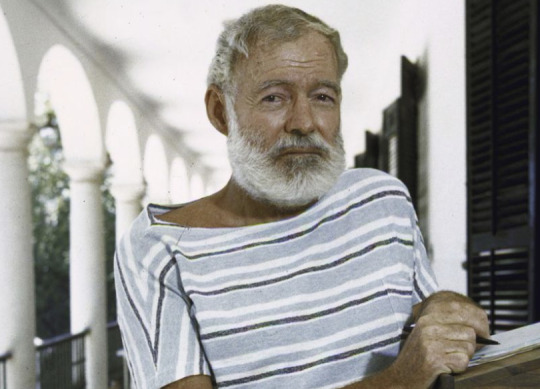
Ernest Miller Hemingway was an American novelist, short-story writer and journalist. Best known for an economical, understated style that significantly influenced later 20th-century writers, he is often romanticized for his adventurous lifestyle and outspoken and blunt public image.
Born: 21 July 1899, Oak Park, Illinois, United States
Died: 2 July 1961 (age 61 years), Ketchum, Idaho, United States
War Veteran: Hemingway served as an ambulance driver in Italy during World War I. He was wounded in action, an experience that deeply influenced his writing, particularly his novel "A Farewell to Arms," which is partly based on his wartime experiences.
Literary Icon: Hemingway is considered one of the most influential writers of the 20th century. His minimalist writing style, characterized by short, declarative sentences and understated emotion, revolutionized modern literature. He won the Nobel Prize in Literature in 1954 for his "masterpieces" which "shimmer with a unique style."
Adventure and Travel: Hemingway was known for his adventurous spirit and love of travel. He often sought out dangerous or exotic locales for his writing and personal pursuits, such as bullfighting in Spain, big-game hunting in Africa, and fishing in Cuba. His experiences in these settings often found their way into his stories and novels.
The Old Man and the Sea: One of Hemingway's most famous works is the novella "The Old Man and the Sea," published in 1952. It tells the story of an ageing Cuban fisherman, Santiago, who engages in an epic struggle with a giant marlin far out at sea. The novella won the Pulitzer Prize for Fiction in 1953 and contributed to Hemingway receiving the Nobel Prize.
Personal Life and Demise: Hemingway led a tumultuous personal life marked by marriages, divorces, and struggles with mental health. He was married four times and had three sons. Sadly, Hemingway also battled depression and alcoholism throughout his life. He tragically took his own life in 1961 at the age of 61, leaving behind a legacy of literary brilliance and enduring influence.
#ErnestHemingway#Author#Literature#NobelPrize#WritingStyle#Adventure#Travel#TheOldManAndTheSea#WarVeteran#WorldWarI#Bullfighting#BigGameHunting#Cuba#Depression#Alcoholism#Legacy#PulitzerPrize#ModernLiterature#Influence#Biography#quoteoftheday
0 notes
Text

He was a Bengali polymath who worked as a poet, writer, playwright, composer, philosopher, social reformer and painter who was born in Kolkata. He was the one to write the National Anthem of India. He was awarded a nobel prize in the year 1913 for his work in the field of literature. He also recieved a nobel prize for his outstanding performance as a social reformer. This honour established his literary reputation worldwide.
nobelprize #nobel #nobelpeaceprize #nobelliteratureprize #guess #quiz #quiztime #guesswho #tuesday #tuesdaytip #literature #literaturelover #prize #literature #literaturelover #nobelpeaceprize #nobelliteratureprize #instapoetry #motivationalquotes #happyholi #trend #trending #npskudlu #nationapublicschool #nationapublicschoolkudlu #parents #students #teachers #schools #kids #npskudlu #nationapublicschool #nationapublicschoolkudlu #parents #students #teachers #schools #kids
5 notes
·
View notes
Text
Nobel Prize 2022 in Literature Awarded To French Author Annie Ernaux
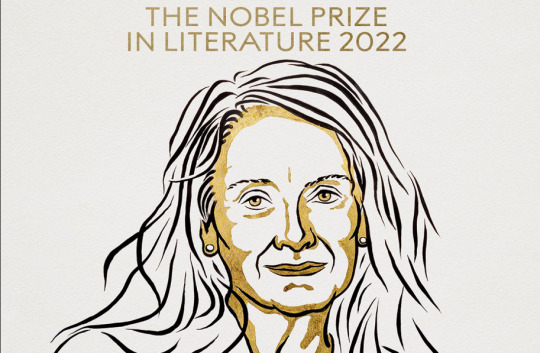
The 2022 #NobelPrize in Literature is awarded to the French author Annie Ernaux for the courage and clinical acuity with which she uncovers the roots, estrangements and collective restraints of personal memory,” the official Twitter handle of The Nobel Prize said.
Annie Ernaux is known for her deceptively simple novels drawing on personal experience of class and gender, news agency AFP reported.
“French writer Annie Ernaux — awarded the 2022 #NobelPrize in Literature — was born in 1940 and grew up in the small town of Yvetot in Normandy, where her parents had a combined grocery store and cafe. Her path to authorship was long and arduous,” the tweet added.
The Nobel Prize laureate, in her writing consistently and from different angles examines a life marked by strong disparities regarding gender, language and class. She has written over 30 literary works.
In a statement, Ernaux said writing is a political act, opening our eyes to social inequality. For this purpose she uses language as “a knife”, as she calls it, to tear apart the veils of imagination.
With great courage and clinical acuity, Annie Ernaux reveals the agony of the experience of class, describing shame, humiliation, jealousy or inability to see who you are, she has achieved something admirable and enduring.
The Nobel Prize laureate Ernaux believes in the liberating force of writing. Her work is uncompromising and written in plain language, scraped clean.
And when she with great courage and clinical acuity reveals the agony of the experience of class, describing shame, humiliation, jealousy or inability to see who you are, she has achieved something admirable and enduring.
Last year, Tanzanian author Abdulrazak Gurnah won the 2021 Nobel Prize in Literature.
Born in 1948 and growing up on the island of Zanzibar, Gurnah has published ten novels and a number of short stories. The theme of the refugee’s disruption runs throughout his work. He began writing as a 21-year-old in English exile, and although Swahili was his first language, English became his literary tool.
2 notes
·
View notes
Link
TIL: Winston Churchill wrote 8-10 million words and won Nobel Prize in 1953.
0 notes